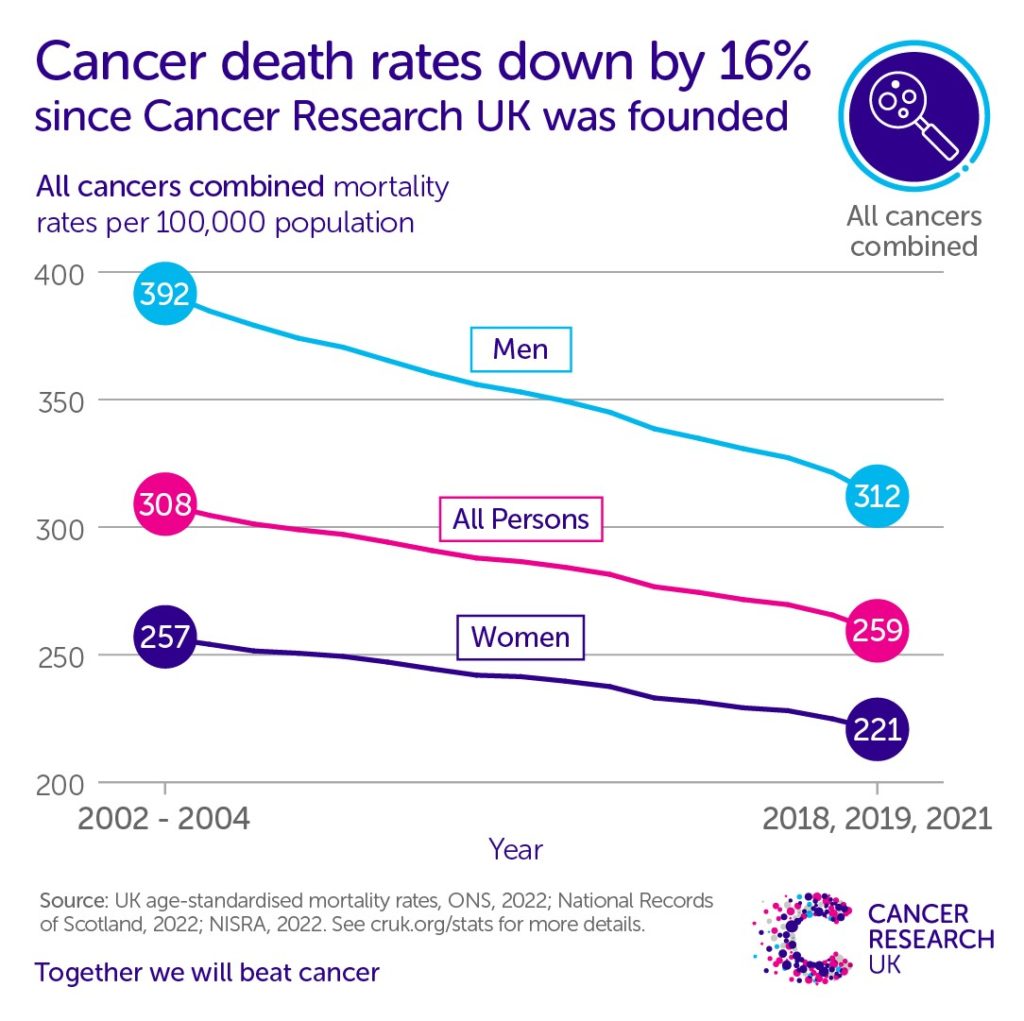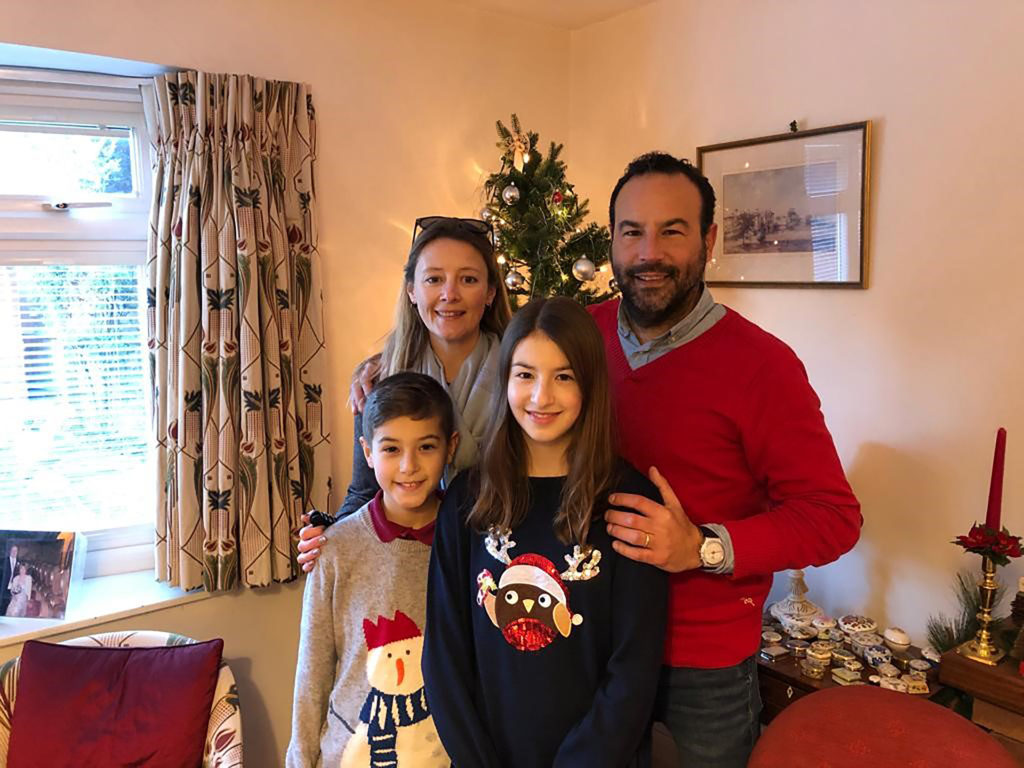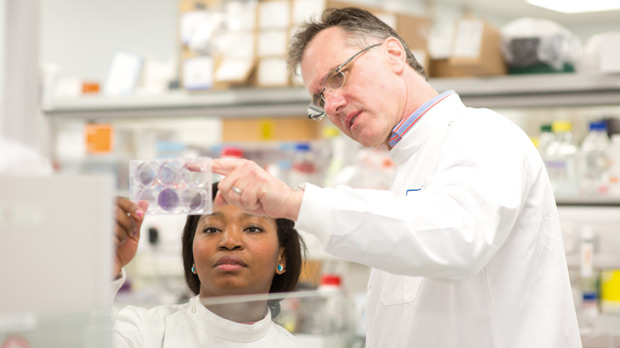This year, we’ve been celebrating our 20th anniversary.
And as part of that, we’re looking back at the influence and involvement we’ve had in reducing cancer death rates.
Since we were founded in February 2002, we’ve invested £5.4 billion into life-changing research. And that’s translated into some incredible results.
Overall, cancer death rates have decreased by 16% in the UK since we were founded. In the early 2000s, around 310 in every 100,000 people died from cancer each year in the UK. Today it’s around 260 in every 100,000.

There are over 100 types of cancers, so some cancer death rates have decreased more than others.
For example, death rates from stomach cancer have fallen around 50%. And the number of people with lung cancer that survive their disease for 5 years has doubled to around 20% since the mid-2000s.
We’ve been at the heart of that change, funding research into early diagnosis and helping develop better treatments for the disease.
There are many reasons for this decrease, including research into more effective and kinder treatments, improvements to screening programmes, which help spot cancers earlier, and strategies to help prevent cancer.
“Discovery science has the power to transform society – indeed every major cancer treatment has been underpinned by it,” says Dr Samuel Godfrey, our research information lead.
“Cancer Research UK has been at the heart of many important discoveries that have driven progress, helping reduce cancer death rates today.”
Preventing cancer and getting an earlier diagnosis
Detecting cancers at an earlier stage, before they can grow and spread, means they are more likely to be treatable.
Screening programmes help detect cancer earlier, and we’ve been instrumental in developing programmes like cervical screening and bowel screening kits, as well as improving symptom awareness among the public.
A big part of that work is our Cancer Awareness Roadshow, which started in 2006. Every year our nurses travel around the country talking to the public about their health concerns and encouraging them to get any abnormalities checked by their GP. They’ve helped thousands of people access health information and their work can be vital in helping people get an earlier diagnosis.
In terms of prevention, improved screening programmes and the rollout of the HPV vaccine have helped to reduce cervical cancer death rates by a third, and we’re hopeful that they’ll continue to decrease. A recent study showed that the HPV vaccine reduced cervical cancer rates by almost 90% in women in their 20s who were offered it at ages 12 to 13.
We have also been at the forefront of influencing successive governments. We continue to encourage research progressing our understanding of the causes of cancers and implementing policies which can reduce cancer incidence like helping to bring about the 2007 ban on smoking in public places.
Better drug treatments
Drugs linked to research by the charity are used to treat more than 125,000 people in England every year – that’s 3 out of every 4 people who receive cancer drugs in the NHS.
Back when we were founded, around 4 in 10 people in the UK survived their cancer for at least 10 years after diagnosis, and now it’s 5 in 10.
Alim’s story
Over 3 years Alim had been diagnosed with testicular cancer 3 times. He was treated with surgery, chemotherapy and then a chemotherapy drug called cisplatin.
Cisplatin was developed with the help of Cancer Research UK scientists, who researched how the drug and other chemotherapy drugs like it can kill cancer cells. Its first UK trial was also supported by one of Cancer Research UK’s predecessor charities, the Cancer Research Campaign, in the 1970s.
“1 in 2 people will have cancer in their lifetime. That is crazy!” Alim says. “We know that research is the only way to understand how cancer works and that’s how we can find more ways to beat cancer.

Alim, his wife and their two children celebrating Christmas.
“Cisplatin saved my life and knowing that Cancer Research UK is responsible for a lot of research behind it gives me a lot of hope for the future.”
More than 20 years since his first testicular cancer diagnosis, and with thanks to IVF, Alim and his wife have two children.
“We are proof that there is always hope,” he says. “Cancer doesn’t have to mean the end of your dreams. I look at my children and see them as my little miracles.
“I see Cancer Research UK as my family. It is a big hope and motivation for cancer patients and their loved ones to know that there is an organisation shouting for us: YOU ARE NOT ALONE! WE WILL BEAT CANCER!”
There’s still a long way to go…
The work of the last 20 years has been a combined effort from everyone at Cancer Research UK, including all of our supporters. Looking forward, we’re committing to spend at least £1.5 billion on research over the next 5 years. That’s more ground-breaking research, more effective treatments and more people surviving cancer.
“It’s wonderful to see the impact that the last 20 years of Cancer Research UK’s work is having on people affected by cancer,” says Michelle Mitchell, our chief executive. “From developing life-saving drugs to influencing governments, every penny of money donated has helped to revolutionise what we know about cancer and saved many lives.
“Despite these hard-fought gains – there is still a long way to go. By making cancer a priority, this Government can help us build upon the amazing work of the last 20 years. Together, we can achieve our goal of beating cancer.”
You can find out more information on our achievements in our timeline.
